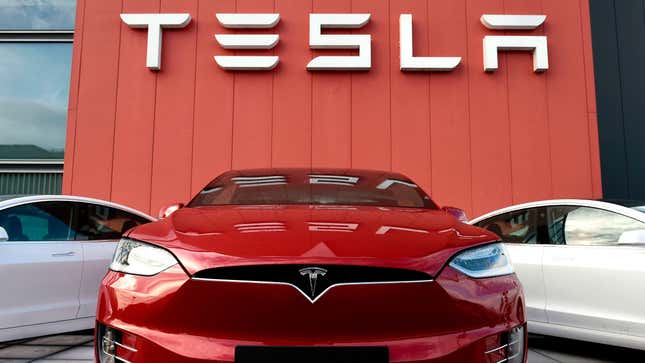
Three weeks into November, Tesla is already on its fourth recall of the month.
On Nov. 19, Elon Musk’s electric car company recalled 321,000 vehicles in the US over tail light issues. The day before it had recalled 30,000 Model X cars because of an airbag deployment problem. Earlier this month, the company called back 40,000 Model S and Model X vehicles manufactured between 2017 and 2021 over potential reduction or a loss of power steering, and 53 vehicles over a side view mirror installation.
According to the Department of Transport’s NHTSA website, Tesla recalls amount to 5% of the total issued so far this year in the US, but is second only to Ford in terms of how many vehicles were impacted.
Despite the frequency and magnitude of these recalls, industry watchers aren’t sounding alarm bells. Most of these are voluntary glitch reports, and in Tesla speak, a “recall” almost never means cars going back to garages and warehouses. Musk takes issue with the federal transport agency and the media’s use of the word recall because the issues almost always need “tiny” over-the-air software fixes, he says.
Like most auto companies, recalls don’t really hurt Tesla’s stock price. There are bigger forces at play, including inflationary pressures as well as Musk’s on-again off-again Twitter deal and its eventual terrible execution. This month, too, the recalls didn’t sink the stock like Musk’s stock sell-off did.
Plus, there are bigger fundamental threats to the business. If Tesla doesn’t find and rectify glitches in time there could be legal trouble. A US justice department criminal probe against the company and its executives over self-driving claims is already underway. Senator Ed Markey (D-Mass.) has also warned Musk that Congress will intervene unless he stops “putting profits over people and his debt over stopping disinformation.”
Charted: Musk moves Tesla stock
Tesla recalls, by the digits
19: US recalls so far this year. A non-exhaustive list of reasons include potentially defective rear-view cameras or front cargo area latches, rolling stops, faulty seat belt alert, windshield defrosting issues, music feature “Boombox” obscuring Pedestrian Warning System sounds, center screen’s CPU overheating, failing power window safety controls, and so on—most of which are solvable over the cloud. In October, though, 24,000 cars were part of a rare physical recall over seat belt problems
3.7 million: Vehicles affected in this year’s US recalls
1 million: Tesla’s biggest single recall in September, over risk of injury in power window safety controls
107,293: China-made Tesla vehicles recalled in the country in May because of the threat of the infotainment system lagging due to not cooling off sufficiently, causing collisions in rare cases
Fun fact: Tesla toys have also been recalled
A $1,900 toy electric ATV for kids made by Radio Flyer, which retailed exclusively on Tesla’s site, violated federal rules. All 5,000 sold had to be recalled and disabled, and Radio Flyer had to give full refunds.
Company of interest: General Motors
GM, which has a service center within 10 miles of 90% of the US population, is repairing Teslas at its service centers. President Mark Reuss has called it “a growing business.” Not only can the Detroit-based company, which is making its own electric vehicle push, get up-and-close with its rival’s cars, it’s also a convenient option for car owners given Tesla’s service centers are far fewer in number and often a fair distance away from its customers. GM claims to have already repaired over 11,000 Tesla vehicles.
Related stories
🐦 A detailed timeline of Elon Musk buying Twitter
🏢 US tech companies have laid off 33,000 people since October